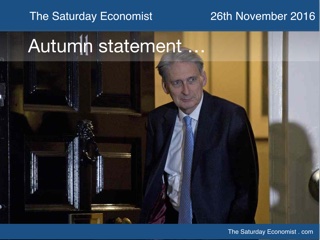 Chancellor of the Exchequer, Phillip Hammond, delivered his first Autumn statement this week. Delivering a country that works for everyone, is a pretty exhausting job. The Prime Minister had wanted to do something for the JAMs, those just about managing. The Chancellor delivered something for the traffic jams, with a significant boost to infrastructure spending. Transport, infrastructure and telecommunications the focus of spending, the Chancellor has charged the newly formed National Productivity Fund with spending £25 billion to improve housing and local infrastructure projects. Almost £5 billion will be devoted to research and development in an attempt to boost productivity. Almost £1 billion will be spent on fibre and 5G connectivity, to develop high speed broadband connectivity across the country. The National Infrastructure Commission will boost spending to just over 1% of GDP. The local growth fund will receive almost £2.0 billion for local transport enhancement. The home builders fund will receive £3 billion. The affordable housing fund will receive £1.4 billion. The housing infrastructure fund will receive £2.3 billion. The Chancellor wants to tackle the longstanding problem of our fastest growing technology firms being snapped up by the "kindness of strangers". An extra £400 million into the Business Bank the solution? Hardly. Ironic in a week, Edinburgh based Skyscanner is snapped up by Chinese travel group Ctrip for £1.4 billion and Stripe's valuation shoots to $9 billion. For the JAM's the Chancellor announced an increase in the living wage, an increase in child care allowance and a commitment to deliver the increase in tax allowances at the lower and higher band. Not much for welfare spending and no changes in business rates, capital allowances and Airport Passenger Duty. Last week we suggested the Chancellor didn't have much to work with in the last Autumn statement. The focus on transport, infrastructure and telecommunications suggests Spreadsheet Phil has a good grasp of the key issues to drive growth in the run up to Brexit. The spending plans will boost growth but won't break the bank as the OBR explained in the latest Economic and Fiscal Update. OBR forecasts ... Robert Chote was in danger of becoming the enemy of the people this week. Or at least the enemy of the Brexit camp. The latest OBR forecasts for the U.K. economy suggested government borrowing was likely to increase by an extra £120 billion over the next five years. Half of the increase could be attributed to the decision to leave the EU, it was explained. Jacob Rees-Moog suggests the forecasts are "too gloomy", Brexit is "terrific" and thanks to Brexit "Happy days are here again" or will be soon, just as soon as we have negotiated the "new deal". The OBR is forecasting growth of 2.1% this year slowing to 1.4% in 2017, rising to 1.7% in 2018 and 2.1% thereafter. The weakness next year a result of a slowdown in household spending and business investment. Government debt is set to rise to over £1.9 trillion over the next few years peaking at 90% of GDP. Should we worry over much about the forecasts? Not really. We expect growth around 2% over the next few years. The service sector will continue to drive growth, consumer spending will continue as earnings rise, business investment in commercial real estate and fixed assets will maintain the momentum from 2016 into next year. GDP Second Estimate Q3 ... The second estimate of GDP growth in the third quarter was released by the ONS this week. Growth in Q3 was confirmed at 2.3%. There were little or no changes to the pattern of output growth. Service sector growth of 3% was driven by a 5% increase in leisure spending and 4% growth in transport and telecommunications. Manufacturing and Construction continue to disappoint. Household spending increased by 2.6%, Investment increased by a modest 1.2%. Government spending was up by less than 1%. Exports appeared to have increased by 4% as import growth remained subdued at just 2.6%. Is this the miracle of depreciation impacting on the economy? Not really. The weakness of domestic demand (up 1.5%) partly to blame for lower imports in the quarter. For the year as a whole the OBR expect growth of 2.1% this year. No reason to expect a significant slow down in 2017 nor 2018 for that matter. The Brexit negotiations will drag on for some years yet. That's assuming Article 50 will be triggered in March next year. So what happened to Markets? Markets, were up - the Dow closed at 19,125 from 18,975. The FTSE closed at 6,840 from 6,775. Sterling was up against the Dollar to $1.245 from $1.234 and up against the Euro to €1.175 from €1.165. The Euro held against the Dollar at 1.059. Oil Price Brent Crude closed at $47.56 from $46.31 The average price in November last year was $44.27. UK Gilts - yields moved down. UK Ten year gilt yields closed at 1.41 from 1.46. US Treasury yields moved to 2.37 from 2.33. Gold closed at $1,245 from $1,296. John That's all for this week ... if you enjoy The Saturday Economist .. JOIN THE SATURDAY ECONOMIST CLUB as an INDIVIDUAL member from just £40 a year. Just click to sign up. Special reports, Survey Results and the Quarterly Economic Outlook are made available to members and sponsors. Don't miss the Business Conference in March next year. The focus on Digital Disruption and the Smart City Challenge! © 2016 John Ashcroft and Company, Economics, Strategy and Social Media, experience worth sharing. ______________________________________________________________________________________________________________ The material is based upon information which we consider to be reliable but we do not represent that it is accurate or complete and it should not be relied upon as such. We accept no liability for errors, or omissions of opinion or fact. In particular, no reliance should be placed on the comments on trends in financial markets. The receipt of this email should not be construed as the giving of advice relating to finance or investment.. ______________________________________________________________________________________________________________ If you do not wish to receive any further Saturday Economist updates, please unsubscribe using the buttons below or drop me an email at [email protected]. If you enjoy the content, why not forward to a friend, the can sign up here ... _______________________________________________________________________________________ For details of our Privacy Policy and our Terms and Conditions check out our main web site. John Ashcroft and Company.com _______________________________________________________________________________________________________________ Copyright © 2016 The Saturday Economist, All rights reserved.
0 Comments
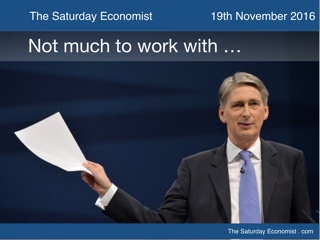 Autumn statement ... in a jam ... Chancellor of the Exchequer, Phillip Hammond, will deliver the Autumn statement next week. An attention to detail and a love of numbers, the Chancellor dubbed "Spreadsheet Phil", will have a tough job on his hands, balancing the books in the years ahead. The Prime Minister has promised money for those "Just About Managing". The Chancellor is in a jam, presenting jam for the JAMs. There are simply too many of them. Ten million according to the Rowntree Foundation. Even the smallest spread will make a big hole in the finances. There simply isn't the money to spend, not much to work with. The OBR forecast will set an economic and fiscal backdrop of slower growth and lower tax receipts. The Chancellor will announce increased expectations of borrowing, up by some £100 billion over the next five years. No wonder gilt yields are rising. UK gilt yields closed at 1.5% at the end of the week. Fears of more gilts and inflation on the rise will push borrowing costs much higher. So what can we expect? Some infrastructure projects will be announced with transport, schools and hospitals the focus. A freeze on fuel duty and child care subsidies may emerge. Tinkering with tax thresholds at the lower and higher levels will appeal to the Tory back bench. Don't expect too much from what will be the Chancellor's first big statement. There simply is not much to work with. Retail sales up 7.4% in October ... There may be something to play with. The OBR forecasts may prove to be too gloomy. Tax receipts should be much stronger than have been realised in the first half of the year. Retail sales were up by 7.4% in volume terms in October. In value, sales increased by 6.6%. Internet sales up by 26% now account for over 15% of all non fuel sales. We haven't seen such strong sales growth since 2004. The U.K is experiencing a retail sales "boom" driven by a strong jobs market and household spending boom. Unemployment fell to 4.8% in the three months to September. The lowest level since 2005. Vacancies are rising, the claimant count is falling. 31.8 million are in work, compared to 31.3 million just twelve months ago. Recruitment difficulties are increasing. No time to close the immigration gates and send foreign workers home. Earnings remain subdued for the moment. Average earnings were just 2.3% in the latest data for September. Private sector pay of 2.8% in the month, is offset by the subdued level of 1.4% in public sector pay. The Bank of England expects earnings to increase over the next two years, inflation is set rise and fast. So what of Inflation ...? CPI inflation fell in October to 0.9% from 1.0% in the prior month. It is the calm before the storm. Service sector inflation slowed to 2.4%. Goods prices continued to fall, albeit at a slower rate of -0.4%. In the chart we highlight the trends in producer prices. Output prices increased by 2.1%. A big swing over the past twelve months. Input costs for manufacturers increased by over 12% and will rise much higher in the months ahead. The recovery in oil and commodity prices, denominated in dollars, will be exacerbated by the weakness of Sterling. The step correlation between input and output costs, between output costs and CPI inflation is evident in our models. The time lag is in months not years. We expect a big hike in CPI inflation in the first quarter of 2017, as import costs increase. So what of U.K. interest rates ...? It is clear the Bank of England acted too soon to cut rates following the referendum result. Strong growth, rising employment, retail sales, household spending and the increase in inflation call for an increase in base rates. If 0.5% was the correct rate before the referendum, 0.25% cannot be the correct rate now. The hike should be back to pre referendum levels, then higher. We have seen retail sales growth of over 7% before, in 2004. We have also seen the unemployment rate of 4.8% before, in 2005. In both periods, the base rate was set at 4.75% Gilt yields averaged 4.5%. Markets are already making the call for gilts, pushing ten year gilt yields to 1.5% at the end of last week. In the U.S ten year bond yields move to 2.3% as Janet Yellen indicated U.S base rates are set to rise "relatively soon". Once the Fed makes the move, the MPC is set to follow. The correlation between UK and U.S. rates is high [0.8442]. We are leaving Planet ZIRP. Good news for savers and pension fund deficits. Not so good for those Just About Managing at home and in the Treasury. So what happened to Markets? Markets, were up slightly - the Dow closed at 18,975 from 18,817. The FTSE closed at 6,775 from 6,730. Sterling was down against the Dollar to $1.234 from $1.260 and up against the Euro to €1.165 from €1.160. The Euro fell against the Dollar to 1.059 from 1.085. Oil Price Brent Crude closed at $46.31 from $44.70 The average price in November last year was $44.27. UK Gilts - yields moved down. UK Ten year gilt yields closed at 1.46 from 1.36. US Treasury yields moved to 2.33 from 2.14. Gold closed at $1,296 from $1,222. John That's all for this week ... if you enjoy The Saturday Economist .. JOIN THE SATURDAY ECONOMIST CLUB as an INDIVIDUAL member from just £40 a year. Just click to sign up. Special reports, Survey Results and the Quarterly Economic Outlook are made available to members and sponsors. © 2016 John Ashcroft and Company, Economics, Strategy and Social Media, experience worth sharing. ______________________________________________________________________________________________________________ The material is based upon information which we consider to be reliable but we do not represent that it is accurate or complete and it should not be relied upon as such. We accept no liability for errors, or omissions of opinion or fact. In particular, no reliance should be placed on the comments on trends in financial markets. The receipt of this email should not be construed as the giving of advice relating to finance or investment. _______________________________________________________________________________________ For details of our Privacy Policy and our Terms and Conditions check out our main web site. John Ashcroft and Company.com _______________________________________________________________________________________________________________ Copyright © 2016 The Saturday Economist, All rights reserved. Our mailing address is: The Saturday Economist, Tower 12, Spinningfields,Manchester, Eng M3 3BZ, United Kingdom 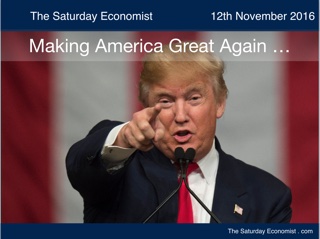 Bringing back the shine to the rust belt ... President Elect Trump is making the transition to the White House. Against all the odds, just months ago, the billionaire business man is set to be the most powerful man in the Western world. Trump has promised to make America great again, to bring the shine back to the rust belt and to bring back manufacturing jobs to the MidWest states of Pennsylvania and Wisconsin. Trump will put a smile back on the faces of blue collar workers by reversing the tide of economic history, bringing back manufacturing jobs lost to China, the Asian block and Mexico. Or will he? Trump has promised to deport millions, rip up trade agreements, apply religious tests, build walls and sabotage international efforts to fight climate change, each of which would hurt many people, according to the Wall Street Journal. Making America Great Again … We heard a similar theme with the Brexit campaign. Take back control of our borders, make Britain great again and stop sending the mythical £350 million to Brussels each week. No need for a wall, when we have the channel with armed guards in the tunnel. A disregard for the truth and a simple proposition stated with intense frequency the recipe to secure the vote of the common man, it would appear. In the U.S. the prize is much greater. Trump has promised to build the strongest economy in the world, doubling the growth rate to 4%. To spend $600 billion on infrastructure. $6.6 trillion to be added to national debt. Creating jobs for millions in the process. The billionaire business man becomes the champion of the blue collar working man. The glitter of Trump wealth has a Peronista charm that has worked before in far off lands but only for so long. How was it achieved … How was it achieved? A simple message stated with intense frequency, pandering to prejudice with an ignorant disregard of the facts. A keyword strategy including sexist, racist, misogynist, prejudiced, patronising, partisan, elitist, nationalist, populist, protectionist, isolationist, xenophobia, jingoistic. A lethal cocktail of non political hatred released from the bottle of bile, now so difficult to contain. How the Mother of exiles must weep. “Here at our sea-washed, sunset gates shall stand A mighty woman with a torch, whose flame Is the imprisoned lightning, and her name Mother of Exiles … “Give me your tired, your poor, Your huddled masses yearning to breathe free, The wretched refuse of your teeming shore. Send these, the homeless, tempest-tossed to me, I lift my lamp beside the golden door!” Can Trumpeter Economics work? ... The President Elect offers a brand of “Trumpeter economics” but can it work? The policies cannot reverse the tide of economic history and the wave of internationalism sweeping the globe. The US economy is set to fade in the twilight zone of Chinese economic hegemony. Trump, taking the role of King Canute, will be unable to stem the tide. According to Zhang Zhozhong Chinese military commentator on Weibo. “The Trump victory marks end of the American era. If he is in office for eight years, he will successfully be the first U.S. president to lead America’s economy from number 1 to Number 2 in the world”. Will Trump stay in office for eight years? It seems unlikely. An egotistical property driven, trophy hunter, will claim the highest real estate prize in January. The vegetable garden in the grounds of the White House will not survive the early Trump days but then what? Imagine the White House with a Donald Trump makeover? All that White, yearning for a gilded porch and a high rise development to capitalise on the narrow high value footprint. Can Trump do much harm? The genius of America’s constitution is to limit the harm one president can do, claims The Economist. We must hope so. According to the Brookings Institute, “There are layers of professional foreign service, intelligence and civil service officers and a web of constitutional and institutional checks and balances that can work to moderate policies that could jeopardise the national interest.” Let’s hope so. Trump has promised heavy tariffs on goods from China but this is nothing new. Reagan imposed 45% tariffs on Japanese motorcycles in the 1980s. Obama imposed a 35% tariff on tyres on taking office. We expect some token tariffs to be imposed but overall, trade wars are counter productive. Trade wars cost American jobs. Ford, Apple and Boeing will be put under pressure to make more products at home but according to the Peterson Institute 1.5m to 5.0 million jobs could be put at risk in the U.S.A. if real trade wars ensue. Policy change is already taking place … Change is already taking place. What is said in the locker room and on the campaign trail should stay in the locker room and on the campaign trail. Trump is engaged in Orwellian conversion. In a White House version of Animal Farm, they will look from Campaigner to President as from pig to man Within months it will be impossible to say, which was which, much of the vulgar campaign rhetoric will have disappeared as the Oval Office surrounds and isolates. Concessions are already on the way for Obamacare, a softer line on trade is set to follow. The interdependence of trade flows will be fully explained to the Trump team. So what of trade agreements ... The Trump camp is opposed to Trans Pacific Partnership and promises a review of NAFTA affecting Canada and Mexico. Prospects for an EU deal remote, the Transatlantic Trade and Investment Partnership is under review. “If trade partners are benefiting, the US must be losing out” the Trump view. It is misguided. What then will become of the much needed Foreign Direct Investment, especially from China, on which the U.S will depend. Trump may claim, NAFTA is the worst trade deal in history. For Mexico 80% of trade goes to the U.S. and Canada. For Canada, 75% of exports are destined for the U.S. A 35% tariff would inhibit trade and increase the cost of living for U.S citizens. The sabre rattling will soften to yield a common sense deal. Trump just loves a great deal! And what of Foreign Policy ... In foreign policy, we are promised a rapprochement with Russia. A challenge to the deal with Iran on the nuclear programme. U.S. may not defend Japan and South Korea against an attack from North Korea, encouraging South Korea and Japan to engage in nuclear arms programme. Trump has threatened NATO. The U.S. is not going to war on behalf of people who do not pay their fair share. Russia is ready and wants to restore full fledged relations with the U.S. The Duma burst into applause on the news of Trump victory. Annexing Crimea, usurping government in the Ukraine, tensions in the Baltic states have risen. Suggestions by Newt Gingrich that Estonia is just a suburbs of St Petersburg, will not help. The U.S. state department is already making noises to soothe NATO nerves. The EU must make strong noises to defend the frontier states. The European Perspective … From a European perspective, the leaders are terrified. Set to face a Constitutional Referendum in Italy, a General Election in Germany and a Presidential Election in France, tough years are in prospect. Brexit was a shock. The Trump victory a second warning. The Italian five star movement wants a referendum on the Euro. Ms Le Pen in France wants a referendum on Frexit. What then of the Euro and the E.U.? On Climate Change ... Trump has claimed global warming is a hoax. A lie perpetrated by the Chinese to render U.S. manufacturing uncompetitive and to undermine the Oil, Coal and Gas industry. China has urged the U.S. government to comply with the Paris accord for the benefit of mankind. The Chinese are faced with the greatest challenge to convert from dirty energy and the largest world share of humanity to protect in the process. Trump has promised to cut taxes and increase spending. Reduce the tax burden with 15% corporation tax rate with personal rates down. The new administration will repatriate corporate earnings tax trapped overseas. Increased spending on infrastructure projects will follow, using American Steel one would hope. It is a huge bill which could cost $7 trillion over 10 years. Markets have reacted with a surge in equity prices and bond yields. Trump is not a fan of Janet Yellen, a self professed Clinton supporter. The head of the Fed will serve her current term ending in 2018. Trump is not a fan of QE nor of low base rates. He is sure to get his way, rates will rise next month. The U.S is set on a path of inflationary expansion of tax cuts and spending which will lead to higher base rates and bond yields. Government borrowing and the trade deficit will increase in the process. The U.S. will become the engine of inflation and growth in the world economy. Making America great again, for a few years at least. Four more years? Unlikely! No shine for the rustbelt, no smiles for the sunbelt. The U.K. may benefit nevertheless from export expansion and a sterling rally. As for the U.S.A. ... God Bless America and the President Elect. So what happened to Markets? Markets, were up post the U.S. election - the Dow closed at 18,817 from 17,974. The FTSE closed at 6,730 from 6,693. Sterling was up against the Dollar to $1.260 from $1.250 and up against the Euro to €1.160 from €1.124. The Euro slipped against the Dollar to 1.085 from 1.112. Oil Price Brent Crude closed at $44.70 from $45.45 The average price in November last year was $44.27. UK Gilts - yields moved up. UK Ten year gilt yields closed at 1.36 from 1.15. US Treasury yields moved to 2.14 from 1.74. Gold closed at $1,222 from $1,296. John That's all for this week ... if you enjoy The Saturday Economist .. JOIN THE SATURDAY ECONOMIST CLUB as an INDIVIDUAL member from just £40 a year. Just click to sign up. Special reports, Survey Results and the Quarterly Economic Outlook are made available to members and sponsors. © 2016 John Ashcroft and Company, Economics, Strategy and Social Media, experience worth sharing. ______________________________________________________________________________________________________________ The material is based upon information which we consider to be reliable but we do not represent that it is accurate or complete and it should not be relied upon as such. We accept no liability for errors, or omissions of opinion or fact. In particular, no reliance should be placed on the comments on trends in financial markets. The receipt of this email should not be construed as the giving of advice relating to finance or investment.. ______________________________________________________________________________________________________________ If you do not wish to receive any further Saturday Economist updates, please unsubscribe using the buttons below or drop me an email at [email protected]. If you enjoy the content, why not forward to a friend, the can sign up here ... _______________________________________________________________________________________ 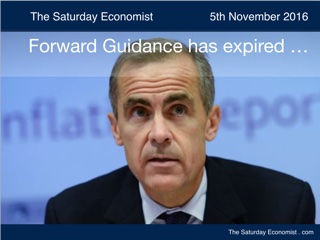 Forward Guidance has expired ... The Bank of England inflation report this week, the Governor is warning about inflation and rising wages. August forward guidance has expired. There is no prospect of a further rate cut in December. The next move in rates will be up, especially if the Fed makes the move before the end of the year. The Bank has revised growth forecasts for the current year to 2.1% compared to expectations of almost half that three months ago. The about turn is an embarrassment for the Bank of England. Obsession with now-casting allowed the model to be swayed by the July snap survey data from Markit PMI. When presented with information which confirms that which is already believed, the natural reaction is to accept new information without question. We call this "Confirmation Bias". The July data confirmed worst fears about a post referendum crash. No time to challenge fundamentals. "Conformation Bias" led to rate cuts and Q.E. expansion which was unnecessary given the strength of growth in Q3. The economy expanded by 2.3% in the post referendum quarter, making a nonsense of the Threadneedle Street grasp of economic reality. The Bank now expects growth of 2.1% this year slowing to 1.4% in 2017. NIESR produced their November update this week. Growth is expected to be 2.0% slowing to 1.4% next year. Why so gloomy about next year? Fears about investment and consumer spending, as real incomes are squeezed, are the two big question marks about growth. We expect growth of 2% this year and 1.8% next. Consumer spending and the leisure pound will continue to drive service sector growth with little hopes for expansion in manufacturing and construction. Investment, driven by expansion in housing and commercial real estate, will slow to growth of 1.2% this year and 1.5% next. And what of inflation ... The Bank expects CPI inflation to peak at just below 3% in the first quarter of 2018. NIESR expects inflation to peak at just below 4% in the final quarter of 2017. Contrarian as always we expect inflation to peak in the first quarter of next year at just over 3% before slowing to around 2.4% by the end of the year. The cost of living increase, driven by hikes in petrol, energy and food, will occur just in time for the April pay round. For the first time in many years, business will face difficult decisions about pay increases and pricing policies. The Bank expects earnings to rise towards 4% over the next two years, compounding the challenge. So how will the Bank react to rising inflation? The Governor is committed to a "see through" policy. Allowing the inflation shock of Sterling depreciation to work through the system, without an increase in base rates. The bank model assumes the inflation impact of a sterling depreciation takes two to three years to "work through" the economy. It is nonsense of course. The "Marmite" issue, love it or like it, argues the impact is much more immediate. We shall soon see. Rates should begin to rise to normalise capital pricing, restoring stability for gilt yields and savers in the escape from Planet ZIRP. According to the Debt Management Office, the value of gilts in issue increased to £1.9 trillion by the end of the second quarter this year. An increase of £250 billion in twelve months funded by the kindness of strangers and the reluctant participation of pension funds. No wonder the Bank had to "Chip In" with the £40 billion Q.E. loan to government. Gilt yields have rallied to 1.2% in recent weeks and are set to rise higher into 2017. So what of Sterling ...? The Governor has made it clear. The MPC has an inflation target. It does not have a currency target. The Bank will not engage in activity to support Sterling with rate moves or currency manipulation. Sterling should be able to find the "appropriate" level to match market ambitions from capital flows. Sterling rallied to $1.25 against the dollar this week, despite the prospects of a U.S rate hike. There was a modest rally against the Euro to €1.124. We expect a dollar rally assuming a Clinton win this month and a Fed rise next month. Nevertheless, it is clear Sterling is oversold against the Dollar and the Euro. There is nothing in the text books about a Brexit shock to currency value. It will be some time yet before the Brexit deal is finalised. The Governor will be back in Toronto, long before the "supply shock" is established. Sterling is set to rally despite the fears about Europe and the current account deficit. And what of the Current Account Deficit ...? Despite or partly because of the weakness of Sterling, we expect the balance of payments deficit to increase to £48 billion this year, rising towards £50 billion in 2017. At 2.5% of GDP, the easing of the current account deficit is unlikely to occur anytime soon. Funding costs are set to rise.The Bank of England will be unable to avoid a rate hike in the Great Escape from Planet ZIRP. So what happened to Markets? Markets, were down on U.S. election fears - the Dow closed at 17,974 from 18,168. The FTSE closed at 6,693 from 6,996. Sterling was up against the Dollar to $1.250 from $1.216 and up against the Euro to €1.124 from €1.111. The Euro rallied against the Dollar to 1.112 from 1.094. Oil Price Brent Crude closed at $45.45 from $49.95 The average price in November last year was $44.27. UK Gilts - yields moved down. UK Ten year gilt yields closed at 1.15 from 1.27. US Treasury yields moved to 1.74 from 1.85. Gold closed at $1,296 from $1,267. John That's all for this week ... if you enjoy The Saturday Economist .. JOIN THE SATURDAY ECONOMIST CLUB as an INDIVIDUAL member from just £40 a year. Just click to sign up. Special reports, Survey Results and the Quarterly Economic Outlook are made available to members and sponsors. © 2016 John Ashcroft and Company, Economics, Strategy and Social Media, experience worth sharing. ______________________________________________________________________________________________________________ The material is based upon information which we consider to be reliable but we do not represent that it is accurate or complete and it should not be relied upon as such. We accept no liability for errors, or omissions of opinion or fact. In particular, no reliance should be placed on the comments on trends in financial markets. The receipt of this email should not be construed as the giving of advice relating to finance or investment.. ______________________________________________________________________________________________________________ If you do not wish to receive any further Saturday Economist updates, please unsubscribe using the buttons below or drop me an email at [email protected]. If you enjoy the content, why not forward to a friend, the can sign up here ... _______________________________________________________________________________________ For details of our Privacy Policy and our Terms and Conditions check out our main web site. John Ashcroft and Company.com _______________________________________________________________________________________________________________ Copyright © 2016 The Saturday Economist, All rights reserved. You are receiving this email as a member of the Saturday Economist Mailing List. You may have joined the list from Linkedin, Facebook Google+ or one of the related web sites. Our mailing address is: The Saturday Economist, Tower 12, Spinningfields,Manchester, Eng M3 3BZ, United Kingdom |
The Saturday EconomistAuthorJohn Ashcroft publishes the Saturday Economist. Join the mailing list for updates on the UK and World Economy. Archives
July 2024
Categories
All
|
| The Saturday Economist |
The material is based upon information which we consider to be reliable but we do not represent that it is accurate or complete and it should not be relied upon as such. We accept no liability for errors, or omissions of opinion or fact. In particular, no reliance should be placed on the comments on trends in financial markets. The presentation should not be construed as the giving of investment advice.
|
The Saturday Economist, weekly updates on the UK economy.
Sign Up Now! Stay Up To Date! | Privacy Policy | Terms and Conditions | |
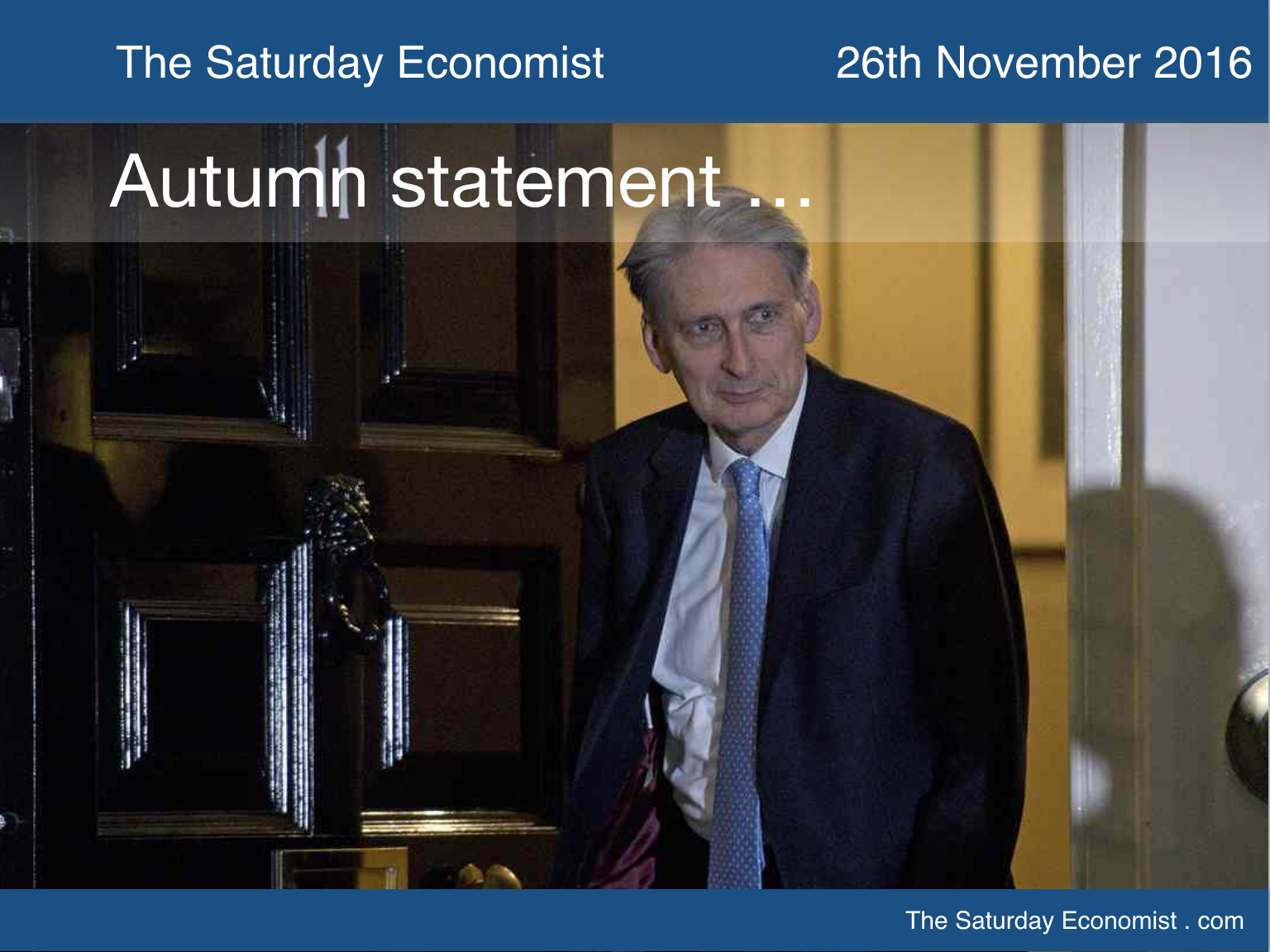
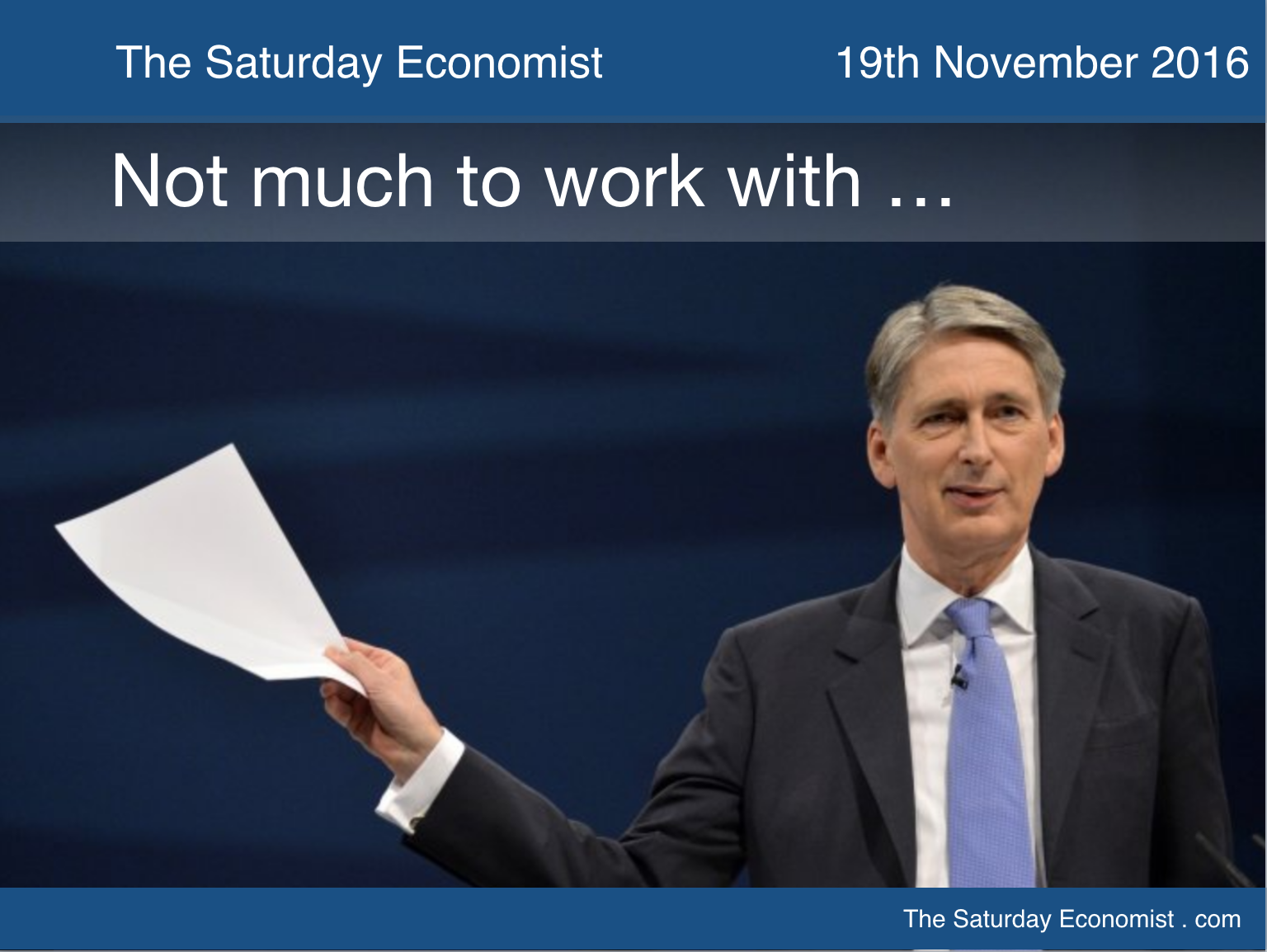
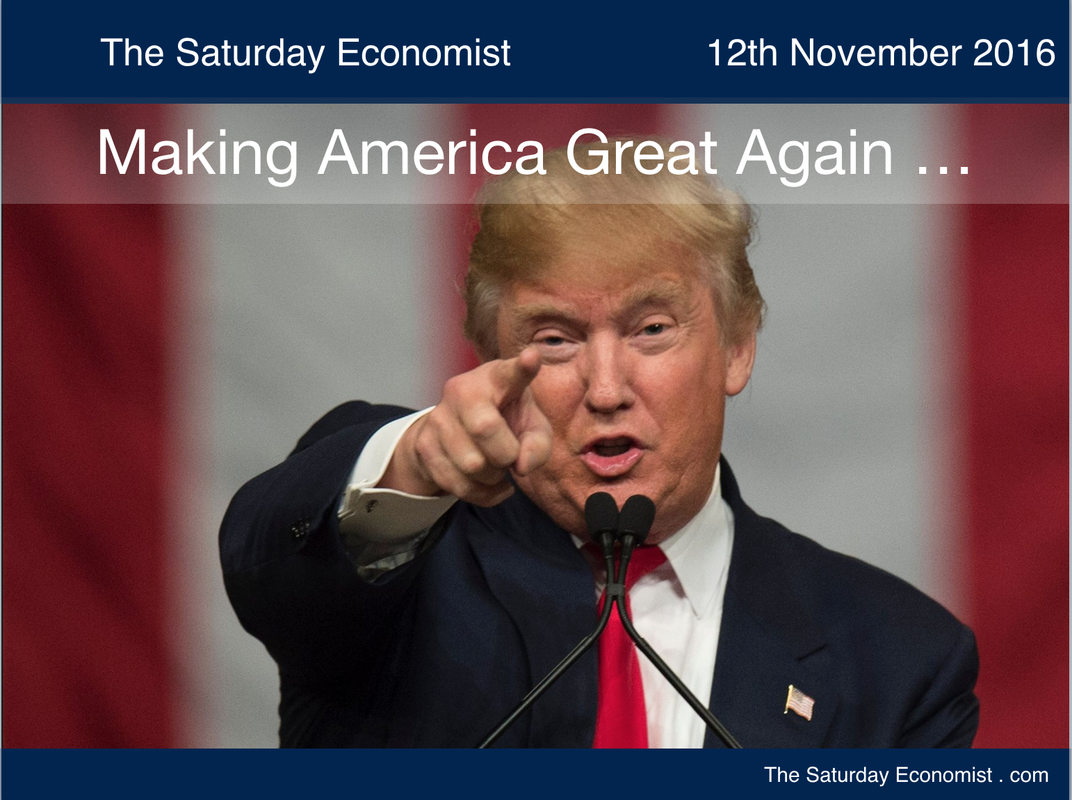
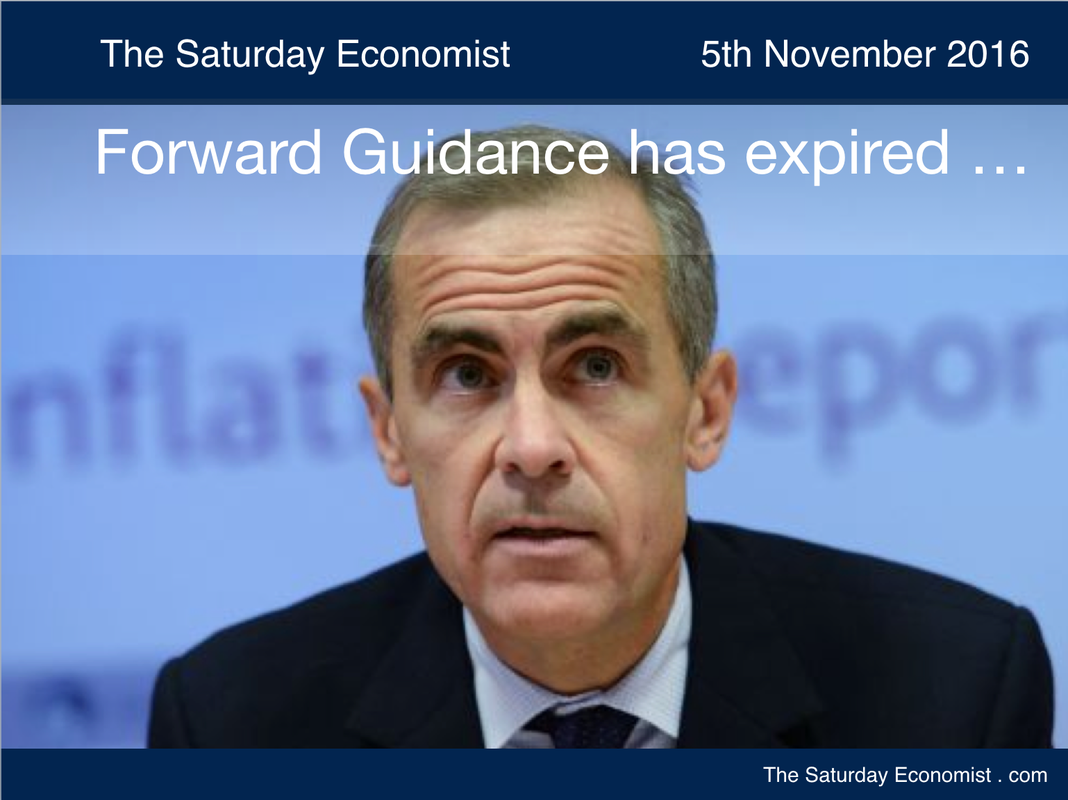
 RSS Feed
RSS Feed